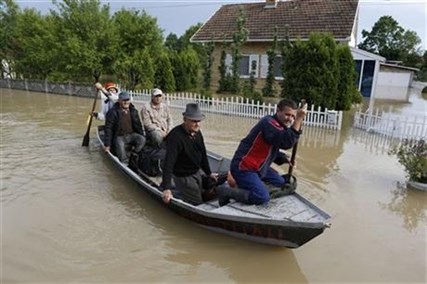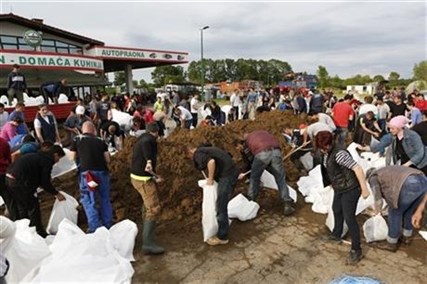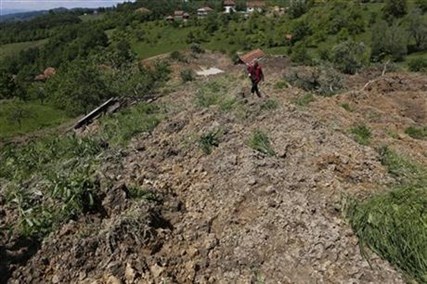
Bosnian people are rescued from their flooded houses by boat in the village of Vidovice near Orasje 200 kms north of Sarajevo, on Sunday May 18, 2014. Packed into buses, boats and helicopters, carrying nothing but a handful of belongings, tens of thousands fled their homes in Bosnia and Serbia, seeking to escape the worst flooding in a century.
Image Credit: AP Photo/Amel Emric
May 18, 2014 - 4:28 PM
BRCKO, Bosnia-Herzegovina — Floodwaters triggered more than 3,000 landslides across the Balkans on Sunday, laying waste to entire towns and villages and disturbing land mines leftover from the region's 1990s war, along with warning signs that marked the unexploded weapons.
The Balkans' worst flooding since record keeping began forced tens of thousands of people from their homes and threatened to inundate Serbia's main power plant, which supplies electricity to a third of the country and most of the capital, Belgrade.
Authorities organized a frenzied helicopter airlift to get terrified families to safety before the water swallowed up their homes. Many were plucked from rooftops.
Floodwaters receded Sunday in some locations, laying bare the full scale of the damage. Elsewhere, emergency management officials warned that the water would keep rising into Sunday night.
"The situation is catastrophic," said Bosnia's refugee minister, Adil Osmanovic.
Three months' worth of rain fell on the region in three days, producing the worst floods since rainfall measurements began 120 years ago. At least two dozen people have died, with more casualties expected.

Bosnian people prepare sandbags to protect the city from flooding near Orasje 200 kms north of Sarajevo, on Sunday May 18, 2014.
Image Credit: AP Photo/Amel Emric
The rain caused an estimated 2,100 landslides that covered roads, homes and whole villages throughout hilly Bosnia. Another 1,000 landslides were reported in neighboring Serbia.
The cities of Orasje and Brcko in northeast Bosnia, where the Sava River forms the natural border with Croatia, were in danger of being overwhelmed. Officials in Brcko ordered six villages to be evacuated.
Brcko Mayor Anto Domic said that unless the Bosnian Army is able to reinforce from the air, the city will be flooded completely. He called for the Defense Ministry to use helicopters to lower steel barriers that could be backed by sandbags to contain the water.
In Serbia, where floods have inundated towns and villages, authorities braced for high water that could last for several more days.

A Bosnian man walks on a broken road after a landslide which swept away eight houses near Kalesija, Bosnia, 150 kms north of Sarajevo, Sunday May 18, 2014.
Image Credit: AP Photo/Amel Emric
Serbian Prime Minister Aleksandar Vucic said Sunday that 12 bodies have been found so far in Obrenovac, site of the coal-fired Nikola Tesla power plant, Serbia's biggest.
The floods and landslides raised fears about the estimated 1 million land mines planted during Bosnia's 1992-95 war. Nearly 120,000 of the unexploded devices remain in more than 9,400 carefully marked minefields. But the weather toppled warning signs and, in many cases, dislodged the mines themselves.
Beyond the immediate danger to Bosnians, any loose mines could also create an international problem if floodwaters carry the explosives downstream. Experts warned that mines could travel through half of southeast Europe or get stuck in the turbines of a hydroelectric dam.
Large parts of eastern Croatia were underwater too, with several villages cut off and hundreds still fleeing the flooded zone in boats and trucks. Refugees were being housed in sports halls and schools, and aid centers were set up to distribute medicine, food, blankets and clothing.
In Serbia, more than 20,000 people have been forced from their homes.
___
Associated Press writers Aida Cerkez in Sarajevo, Marko Drobnjakovic in Veliki Crljeni, Serbia; Almir Alic in Doboj, Bosnia; Amel Emric in Brcko, Bosnia; and Sulejman Klokoqi in Horozovine, Bosnia contributed to this report.
News from © The Associated Press, 2014